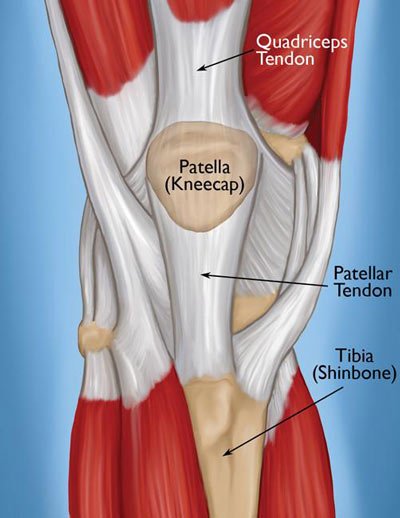Knee pain can mean a number of things, from a pulled muscle to a torn ligament. It takes an experienced pain management doctor to determine if you have tendonitis knee pain. Once you have a diagnosis, you have many non-surgical approaches to a cure. Visit Pain Management NYC for a range of knee tendonitis treatment options, including knee injections.
Knee tendonitis occurs when you damage one of the tendons in your knees. Tendons are strong fibrous tissue that anchor a muscle to a bone, whereas a ligament connects two bones. Because your knees are important weight-bearing joints that enable your mobility, they’re composed of a complex structure of bone, cartilage, tendons, ligaments, muscle and other connective tissue.
A knee injury can lead to tendonitis knee. You also can develop tendonitis in your knee from repetitive motions, like walking long distances, jogging or even standing for long periods of time. If your knee pain doesn’t respond to at-home remedies, you may have done more harm than you realize. When you search for an injury clinic near me, look to Pain Management NYC for pain relief.
Knee Tendonitis Symptoms
When you have knee tendonitis, you feel mild-to-severe pain above or below your kneecap, depending on the tendon you’ve injured. You also experience swelling around the knee injury. The skin over your knee feels warm to the touch from the inflammation. In severe cases, your pain turns chronic and becomes something you have to deal with every day.
A tendonitis knee is weaker since the muscle attached to the tendon can’t work as efficiently. If you don’t treat the tendonitis, you can do permanent damage to your knee. Chronic pain doesn’t ease up and can even wake you up in the night. The best pain management doctor in NYC needs to examine your knee before prescribing any kind of tendonitis knee treatment.
Risk Factors for Knee Tendonitis
You’re at risk of developing knee tendonitis if you have a job that forces you to pull, push, carry and lift heavy objects on a daily basis. Age, obesity and arthritis are other risk factors for tendonitis. Even if you avoid tendonitis, you may end up with a sprained knee, a torn ligament or a torn meniscus.
 Playing certain sports puts you in danger of injuring your knee — any knee injury may lead to a tendonitis knee. For example:
Playing certain sports puts you in danger of injuring your knee — any knee injury may lead to a tendonitis knee. For example:
- Athletes like soccer or basketball players can get knee injuries from the sudden twists and turns that happen while playing.
- A direct impact to your knee can also cause knee tendonitis. Trauma is common while playing hockey or football, where you consistently get hit or fall hard on the ground.
- Repetitive movements of the knee joint cause wear and tear of your knee tendons. This type of injury seems to hit runners, cyclists and skiers harder than others.
- Weekend sports warriors are susceptible to developing tendonitis in their knees. When you don’t maintain the same level of physical activity during the week, you may be less prepared for the sudden, intense competition.
Diagnosing Tendonitis in the Knee
Consult the top NYC pain management specialist to pinpoint the reason for your knee pain. An accurate diagnosis requires a medical history, including when you hurt your knee, a thorough examination by a specialist and possibly other medical tests, such as:
- X-rays, which can uncover fractures and dislocations
- MRI scans, to view your tendons and ligaments
- CAT scans, to rule out patellofemoral pain syndrome or iliotibial band syndrome
- Lab tests, to check for knee bursitis
Lower back pain conditions — like sciatica, degenerative disc disease, a pinched nerve and piriformis syndrome — may be causing your knee pain. Pain in your knee may also be the result of diabetic neuropathy or peripheral neuralgia. A damaged patellar tendon, which stretches over your kneecap, causes patellar tendonitis.
Knee Tendonitis Treatment
Once your injury doctor at Pain Management in New York determines that you have tendonitis in the knee, he provides recommendations on how to best treat your condition. The first thing is to stop doing the activities that aggravate your knee pain, like climbing stairs or playing sports. You may also have to ice your knee to stop the inflammation and swelling.
But your doctor can take other measures to treat your pain and help your knee heal. Tendonitis knee treatment at a top pain clinic in Manhattan includes:
- Knee injections that put medicine right where you need it
- Trigger point injections
- Nerve block injections
- Hip injections or foot injections if pain in these areas adds stress to your knee joints
- Radiofrequency ablation to deaden the nerves in your knee
Knee pain limits your quality of life and puts a damper on an active lifestyle. Have your knee examined and move toward a pain-free life with these minimally-invasive, non-surgical procedures to reduce your pain and encourage healing in your knee. Contact Pain Management NYC today.

Boleslav Kosharskyy, MD, is a top-rated, best-in-class interventional pain management doctor. He is board-certified in Anesthesiology, Interventional Pain Medicine, and Palliative Care.
Dr. Kosharskyy is an Associate Professor of Anesthesiology and Rehabilitation Medicine at Albert Einstein Medical College. He’s also the Associate Medical Director of Pain Medicine and Director of Anesthesia for the Joint Replacement Center at Montefiore Medical Center and Albert Einstein Medical College.
He is an active member of the American Society of Anesthesiology (ASA), the American Society of Regional Anesthesia and Pain Medicine (ASRA), and the New York State Society of Anesthesiologists (NYSSA)
